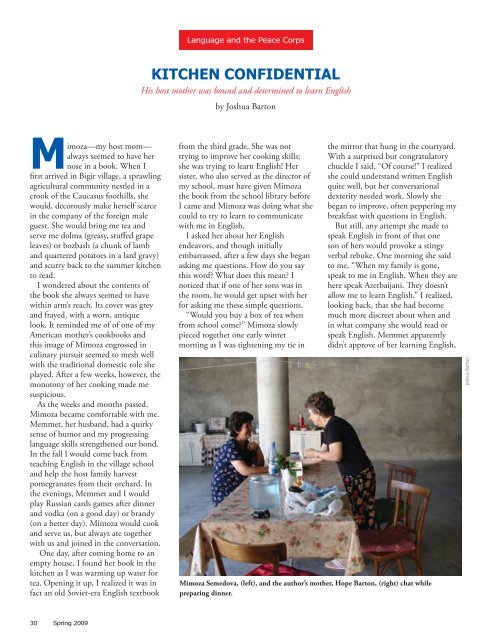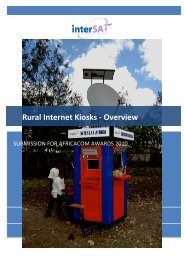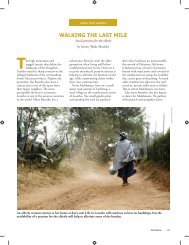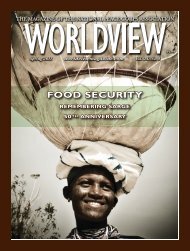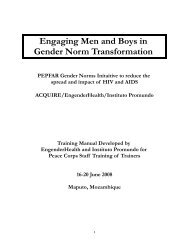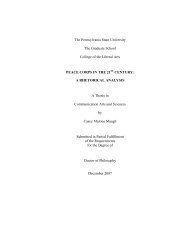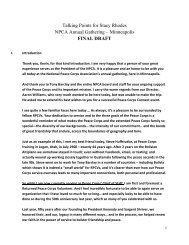special issue: inauguration 2009 - National Peace Corps Association
special issue: inauguration 2009 - National Peace Corps Association
special issue: inauguration 2009 - National Peace Corps Association
You also want an ePaper? Increase the reach of your titles
YUMPU automatically turns print PDFs into web optimized ePapers that Google loves.
Language and the <strong>Peace</strong> <strong>Corps</strong><br />
KITCHEN CONFIDENTIAL<br />
His host mother was bound and determined to learn English<br />
by Joshua Barton<br />
Mimoza—my host mom—<br />
always seemed to have her<br />
nose in a book. When I<br />
first arrived in Bigir village, a sprawling<br />
agricultural community nestled in a<br />
crook of the Caucasus foothills, she<br />
would, decorously make herself scarce<br />
in the company of the foreign male<br />
guest. She would bring me tea and<br />
serve me dolma (greasy, stuffed grape<br />
leaves) or bozbash (a chunk of lamb<br />
and quartered potatoes in a lard gravy)<br />
and scurry back to the summer kitchen<br />
to read.<br />
I wondered about the contents of<br />
the book she always seemed to have<br />
within arm’s reach. Its cover was grey<br />
and frayed, with a worn, antique<br />
look. It reminded me of of one of my<br />
American mother’s cookbooks and<br />
this image of Mimoza engrossed in<br />
culinary pursuit seemed to mesh well<br />
with the traditional domestic role she<br />
played. After a few weeks, however, the<br />
monotony of her cooking made me<br />
suspicious.<br />
As the weeks and months passed,<br />
Mimoza became comfortable with me.<br />
Memmet, her husband, had a quirky<br />
sense of humor and my progressing<br />
language skills strengthened our bond.<br />
In the fall I would come back from<br />
teaching English in the village school<br />
and help the host family harvest<br />
pomegranates from their orchard. In<br />
the evenings, Memmet and I would<br />
play Russian cards games after dinner<br />
and vodka (on a good day) or brandy<br />
(on a better day). Mimoza would cook<br />
and serve us, but always ate together<br />
with us and joined in the conversation.<br />
One day, after coming home to an<br />
empty house, I found her book in the<br />
kitchen as I was warming up water for<br />
tea. Opening it up, I realized it was in<br />
fact an old Soviet-era English textbook<br />
from the third grade. She was not<br />
trying to improve her cooking skills;<br />
she was trying to learn English! Her<br />
sister, who also served as the director of<br />
my school, must have given Mimoza<br />
the book from the school library before<br />
I came and Mimoza was doing what she<br />
could to try to learn to communicate<br />
with me in English.<br />
I asked her about her English<br />
endeavors, and though initially<br />
embarrassed, after a few days she began<br />
asking me questions. How do you say<br />
this word? What does this mean? I<br />
noticed that if one of her sons was in<br />
the room, he would get upset with her<br />
for asking me these simple questions.<br />
“Would you buy a box of tea when<br />
from school come?” Mimoza slowly<br />
pieced together one early winter<br />
morning as I was tightening my tie in<br />
the mirror that hung in the courtyard.<br />
With a surprised but congratulatory<br />
chuckle I said, “Of course!” I realized<br />
she could understand written English<br />
quite well, but her conversational<br />
dexterity needed work. Slowly she<br />
began to improve, often peppering my<br />
breakfast with questions in English.<br />
But still, any attempt she made to<br />
speak English in front of that one<br />
son of hers would provoke a stingy<br />
verbal rebuke. One morning she said<br />
to me, “When my family is gone,<br />
speak to me in English. When they are<br />
here speak Azerbaijani. They doesn’t<br />
allow me to learn English.” I realized,<br />
looking back, that she had become<br />
much more discreet about when and<br />
in what company she would read or<br />
speak English. Memmet apparently<br />
didn’t approve of her learning English,<br />
Mimoza Semedova, (left), and the author’s mother, Hope Barton, (right) chat while<br />
preparing dinner.<br />
Joshua Barton<br />
30 Spring <strong>2009</strong>


